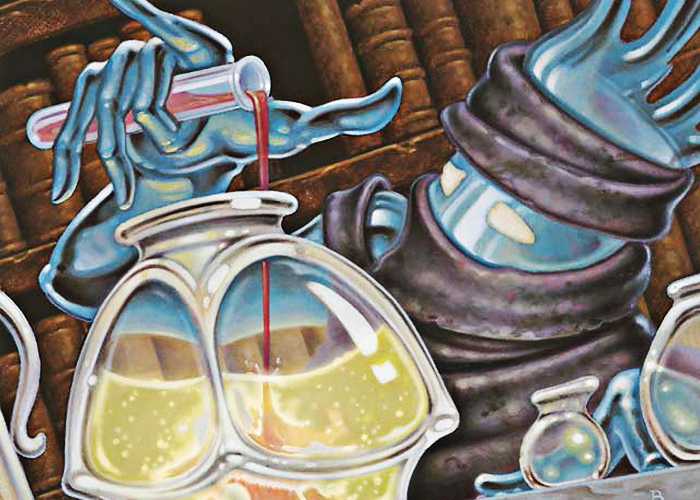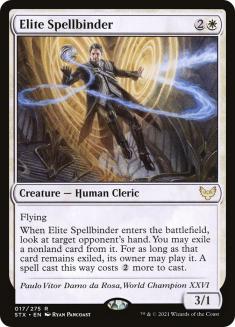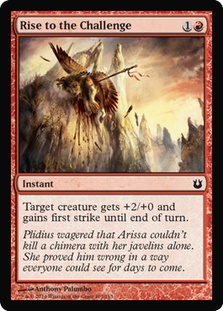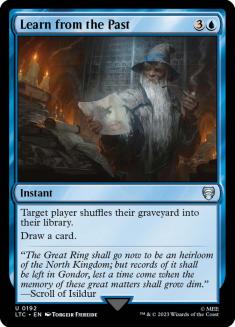Wizards of the Coast (WotC) announced the end of the Magic Pro League (MPL), the Rivals League (Rivals), and “professional Magic as a career” shortly after announcing that they’d be sanctioning paper play again. They’ve declared their commitment to Organized Play and hosting large paper events, but also that they won’t aspire to support competitive play as a career path. As they haven’t outlined what Organized Play will look like, I’ll share my thoughts on what I’d like to see.
As we know, the MPL was more or less a complete failure. WotC wanted to promote tournaments with large prizes to attract outside attention and large sponsorships, and that never happened. More to the point, I don’t really think it’s something anyone should have been particularly concerned with. Magic Esports wanted to be League of Legends or whatever, but it isn’t that. Trying to compete as if it were doesn’t play to its strengths.
Partially, I think the issue is that pro players complained that they didn’t make enough money, so WotC sought a way to build a structure that might let them make money without WotC needing to spend more money themselves. Their plan for this was to attract external sponsorships.
My hot take as a professional Magic player: I’ve never really cared about a lack of money in Magic. There was enough money that I could justify working toward it, and enough promotion that it let me make a living off a combination of writing/content creation and tournament winnings. I think the Magic community is actually slightly worse off if there’s enough money in competing that professional players have an incentive to put all their efforts into maximizing their competitive equity rather than using tournament success to fuel a content creation career. I also don’t think it’s good for Magic as a hobby competition if competing at the highest level is demanding enough that people with regular employment can’t do it.
To me, it’s ideal if there’s enough money that people can get excited about it, but not so much that it pushes people to unhealthy or uncooperative behavior. I think it’s appropriate that tournaments are at least as much about the glory. Of all the prizes Magic has offered, the one I most wish I could have won is the old Invitiational/new World Championship “your likeness on a card” prize, not whatever amount of money first prize was at the Arena Invitational or wherever the biggest cash prize was.
Thursday’s announcement clarified that appearance fees attached to Pro Levels won’t return. I don’t see this as a deathblow to the Pro Tour or the lifestyle of a professional Magic player if content creation is the main focus of their role within Magic.
I’m kind of approaching this backwards. I think Organized Play should be built from the ground up, meaning starting with local stores and open tournaments that impact everyone, not just what the scene looks like for the top 50-500 players, but I feel like I need to start here because this feels like where WotC’s focus has been (however, the announcement has clarified that they’re already shifting their focus in this way).
Anyway, from WotC’s perspective, sponsored Organized Play promotes and sells the game. I wouldn’t expect anything different. The issue is that I think they’ve been trying to use high-level competition to attract new players to the game. That’s not what its role should be.
First of all, Magic is hard, and the best players are very good. If new players join Magic just to win large prizes, they’ll quickly realize that’s not a realistic goal and leave.
Moreover, new games trying to find space in a competitive market have tried this approach over and over. It never works well. Games shouldn’t try to attract new players with the promise that they can make money. Those aren’t players who will spend money on the game anyway. I know, because I’ve played a lot of different games competitively because those games offered prizes I could win. I’ve won a lot of prizes playing other games, but almost never bought any of their products to do it. (Okay, that anecdotal story isn’t actually good evidence or the basis of my knowledge. I’ve seen these games repeatedly fail, and I’ve seen a lot of other players in my position.)
Organized Play should serve existing players. It’s a way to get people who already play Magic because they love it to get more involved, to justify investing more of their time and money into the game.
Let me repeat. Don’t try to attract new players based on highly competitive tournaments. They’ll lose and leave the game. Attract new players with the fun and accessible parts of Magic — art, flavor, casual games, and most importantly social experience. Once people are playing for fun, if they decide that advanced strategy and competition appeal to them, offer that opportunity. Those players are people who will organize their friends and get them more invested and grow the game.
Creating the competitive space for established players who want a chance to play more and meet others is extremely valuable. Organized Play is worth supporting and investing in because it converts kitchen-table players who might buy a few packs every set and play with a couple of their friends to players who are going out and meeting other players, participating in and building a community, and likely buying boxes or cases of new sets. That’s valuable. It’s not the best way to attract brand-new players, but it doesn’t have to be. There are other tools for that.
This perspective brings me to my central thesis.
Organized Play should be designed to create the best experience for the players.
It shouldn’t be designed for spectators or advertisers. It should be about creating a fun experience for players. Players at home who watch should see people who love Magic having fun competing against each other in an environment that they’d want to be a part of. That’s what selling the dream is. It’s not about how much money they can make playing Magic. It’s about how fun and rewarding their hobby can be.
The MPL was a disaster because it imploded an entire competitive infrastructure that offered players at a variety of points in their competitive career a path to advancement. Beyond that, even the players who are actually in the MPL don’t particularly enjoy it as a competitive structure. They just have to engage because it’s a way they can make money doing something they love. That’s not how this should be.
Okay, So What Do I Want?
The most important thing we lost with the creation of the MPL was the attainability of professional play. I don’t mean it was easy and anyone could do it. I spent around a decade trying to qualify before my first Pro Tour, but the path from playing in local events to earning Planeswalker Points to get byes at Grand Prix to earning Pro Points from GP finishes to getting RPTQ invites from making Bronze or Silver Pro Levels, and then maybe managing a qualification and a solid finish to get enough Pro Points that a few more GPs could let a player hit Gold offered attainable milestones. I’d like to see more achievements and milestones players can hit that open doors into high-level play.
The big thing I’ve always wanted from Organized Play that WotC never really seemed to try to solve was that I wanted it to stop driving players apart and splintering play groups. I used to drive to PTQs with my friends when we were all trying to qualify. Then I qualified, and I couldn’t do that anymore. Some of my friends kept going, some didn’t. Some more of them qualified, so they couldn’t go to PTQs anymore. That made it even harder and less likely for the other players to keep going to PTQs.
Then the players who had qualified started preparing for the Pro Tour, which was a completely different format from the PTQs that the players who hadn’t qualified were working on, and it fractured the local competitive play group into separate groups of qualified players and non-qualified players who basically never saw each other.
I’d prefer Magic tournaments bring people together and offer aspiring players as many opportunities to interact with and learn from professional or other more successful players as possible.
This part is a little tricky. Arena matchmaking has made me increasingly appreciate the importance of pairing people of comparable skill levels. I prefer playing Best-of-Three Limited, but the only ranked option is Best-of-One. As a result, I play against relatively experienced players when I play ranked Best-of-One at Mythic rankings, while I play against more inexperienced players if I play Best-of-Three, which results in a less satisfying competitive experience. The same is true in paper — it’s more fun to compete against players at a similar skill level.
While I think there’s a lot to be said for getting very experienced and relatively inexperienced players together and playing against each other in person because it’s a great learning environment for less experienced players and the inherent variance in Magic does allow them to win sometimes (which can be really fun for them), I do think it’s a better competitive experience if players are playing against comparably skilled opponents.
One question that I think is worth asking is whether the Pro Tour or something similar is worth it. Specifically, is it useful to have an exclusive tournament series that players have to qualify for? Personally, I think that it is. The exclusivity makes playing in it feel special in a way that creates a lot of value in players’ minds. This lets organizers host qualifiers that have relatively poor prize support outside of the qualification, but that still attract players. I think it’s efficient for organizers to create this manufactured scarcity that adds glory to tournaments that make them feel less like independent cash games and more like part of a larger circuit.
If there’s an exclusive tournament series, that raises questions about how often, how large they are, and how players qualify. Personally, I think the history of the Pro Tour is valuable and I’d like to see its return. In a vacuum, it may or may not actually be the best system, but I think the history and name have enough value that they offset any other inefficiencies compared to a more optimal system. I’d like Pro Tours to happen roughly as frequently as sets release. I’d also like for them to honor the Hall of Fame qualifications.
I don’t think there’s similarly compelling history dictating the nature of qualifying tournaments. Instead I’d like to see a system that rewards consistency at lower levels in addition to winning single tournaments. We’ve heard lots of stories of players who have had near-misses in several events in a single qualifying season who people think should be eligible to play in the Pro Tour based on that, and I think it’s better if there’s a system for that. Originally, ratings-based qualifications accomplished this. Problem was, they incentivized players not to play to sit on their rating, leading (correctly) to their removal. I’d like to see more decisions similarly made based on the impacts of the incentives they create.
I’d like a Magic Online-style system where players can earn Qualification Points at tournaments and spend them to enter events. Maybe playing a in a Pro Tour costs 50 QPs. PTQ Top 8s pay 50 QPs for 1st, 20 QPs for 2nd, 10 QPs for 3rd-4th, and 5 QPs for 5th-8th. A Grand Prix win could award 75 QPs, a Top 8 might award 50, and other amounts based on record. Players could store more than 50 QPs at a time, but maybe each point expires if it’s not used within a certain amount of time from when it’s earned (maybe two years, and players obviously spend their oldest points first).
In this system, any player can play in any qualifying tournament, because the points matter to everyone. You also don’t necessarily need Pro Levels, because players can start to make plans to play in every Pro Tour once they have multiple PTs worth of QPs stored up. High PT finishes can pay larger numbers of QPs, like maybe 200 for a win, to make sure that player can play at least the next year of events (while likely giving them a cushion to play more than that).
Such a system allows for rewards for consistency without making single-event qualification impossible. Players who have already qualified can still compete in a level playing field with correct incentives against players who haven’t qualified, so that you don’t splinter your competitive infrastructure. It lets people feel like they’re working toward something without complicated rules and structures around a variety of benefit levels.
Organized Play should strive for something like this, that has the following traits:
- Easy to understand and communicate.
- Fun to engage with.
- Encourages playing without demanding that players play more than they want, but most importantly, never discourages playing.
- Creates value in the form of glory by offering unique and exclusive prizes that have value beyond money. (Side note: exclusive printings of cards that can only be earned through prestigious tournament finishes are pretty cool. Things like RPTQ foils are similar to this, but I’d like them to be more exclusive and not foil.)
- Offers stepping stones, benchmarks, or some tangible way of tracking progress so that players feel like they’re working toward something.
I wrote the bulk of this article before Thursday’s announcement. While thinking through what made sense to me in overhauling the system, I realized that Pro Levels weren’t an essential part of my ideal vision for Organized Play. The announcement that the MPL is ending and there won’t be a focus on Pro Levels/appearance fees/direct involvement in assessing Magic prizes as a sustainable income honestly isn’t discouraging to me. I think putting more focus on lower-level Organized Play is great. It sounds like there will still be prestigious events that players have to qualify for.
I doubt the future will look exactly like what I’ve suggested here. Still, I’m optimistic that it will have a lot more in common with this than the MPL system has had.





